By R. Natarajan, Managing Editor & Publisher
With the accelerated growth in the manufacturing sector, automation plays a vital role and contributes major revenue for the exchequer. Since India and China have emerged major glowth centres, the global automation companies have set ambitious sales targets in these two countries. It is against this backdrop that the Automatica 2012 held during May 22-25, has assumed greater significance.
The MOTORINDIA Managing Editor, who was specially invited to cover this world event, spoke to many automation industry experts to learn their views on the specific Indian market prospects.
Here are their views:
Adept
 One of the challenges facing the automation sector in India, according to Mr. John Dulchinos, President & Chief Executive Officer, Adept, is its small market. It is hard to justify a production facility for automation in the country to support its production volumes. At the same time, import levies are very high, making robotics very costly. The challenge lies in balancing local manufacturing with importing.
One of the challenges facing the automation sector in India, according to Mr. John Dulchinos, President & Chief Executive Officer, Adept, is its small market. It is hard to justify a production facility for automation in the country to support its production volumes. At the same time, import levies are very high, making robotics very costly. The challenge lies in balancing local manufacturing with importing.
He said: “We have a couple of small distributors and integrators in India. We make small robots and sell them to big companies to make small product assemblies. Currently the products we sell in India come from the US, while the application support is either from the India or Singapore office. The import duty we pay is very high, at 40-70 per cent”.
Adept strongly feels that for India to become a major robotic market, the infrastructure should be much improved.
“We have 185 employees across the world, of which 5-10% are in India. India is an important country for us, and there is a lot of talent. We don’t sell to the automotive OEMs. Instead, we sell to component manufacturers like Bosch, Delphi and Hella. The number of robots despatched to India as given in the IFR Statistics are actually under-stated, because some units are sent to India from the company headquarters, which are not taken into account in the statistics”, he added.
FANUC
 According to Mr. Olaf Gehrels, President, FANUC Luxembourg Corporation S.A., FANUC sold 30,000 robots globally last year, almost 60 per cent of which for the automotive sector. The major markets include North America, Europe and Asia. The Indian market is very important. About 8,000 robots were sold in Europe. The Chinese market demand will drive further manufacturing towards Asia.
According to Mr. Olaf Gehrels, President, FANUC Luxembourg Corporation S.A., FANUC sold 30,000 robots globally last year, almost 60 per cent of which for the automotive sector. The major markets include North America, Europe and Asia. The Indian market is very important. About 8,000 robots were sold in Europe. The Chinese market demand will drive further manufacturing towards Asia.
FANUC has a broad range of products, the smallest one to handle 500g upto the M2000 which can handle 1,350 kg. 80 models covering 1,350 kg of payload weight.
KUKA
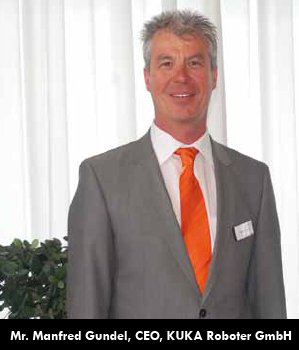 Mr. Manfred Gundel, Chief Executive Officer, KUKA Roboter GmbH, said: “We look at India from the automotive side. We have the combination of local and European JVs. The degree of automation from the European JVs is 60% higher and the local JVs, at around 20-30%. Most robots turned out are based on a higher degree of automation”.
Mr. Manfred Gundel, Chief Executive Officer, KUKA Roboter GmbH, said: “We look at India from the automotive side. We have the combination of local and European JVs. The degree of automation from the European JVs is 60% higher and the local JVs, at around 20-30%. Most robots turned out are based on a higher degree of automation”.
In the automotive industry, KUKA is the only one to have a single modular system for 9 kg up to 300 kg. From a payload of more than 250 kg, it has a heavier robot, which is of course more expensive. The company products are of less weight, consuming lower energy. Almost 50 per cent of the company robots are for the automotive sector and the other half for general industry.
Growing markets in India, Brazil and China do not use the same technology as in Europe. KUKA is indeed a complete solution provider for industry applications across all markets.
Referring to the leading customers of the company, Mr. Gundel said, Daimler uses KUKA’s control system for the cabins. The small robots made by the company are more flexible than the bigger ones. Light-weight robots are suitable for the automotive sector.
A new advanced robot which is undergoing trials can work like an assistant to a factory worker in the manufacturing line, according to Mr. Paul Kho, Head of Corporate Communications, KUKA Roboter GmbH.
FESTO
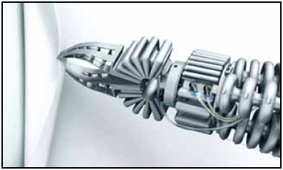 Festo is working closely with major vehicle manufacturers in Germany, offering its full support to design and production lines. In the field for a long time, it offers a lot of customer solutions, particularly special handling systems, modified products and modular services for air fabrication. All the products are OE-driven with less scope for the aftermarket.
Festo is working closely with major vehicle manufacturers in Germany, offering its full support to design and production lines. In the field for a long time, it offers a lot of customer solutions, particularly special handling systems, modified products and modular services for air fabrication. All the products are OE-driven with less scope for the aftermarket.
ISRA Vision
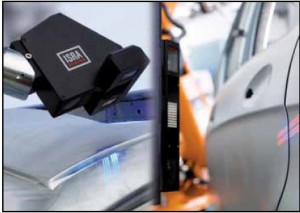 Mr. Enis Ersü, Executive Board Chairman/CEO, ISRA Vision AG, observed: “Though the general focus of the company is on sectors like steel, paper, plastic film and solar energy, it has now turned its attention to the automotive industry. For this, it has already established its Indian subsidiary at Pune headed by Mr. Anand Mehta, Country Manager.
Mr. Enis Ersü, Executive Board Chairman/CEO, ISRA Vision AG, observed: “Though the general focus of the company is on sectors like steel, paper, plastic film and solar energy, it has now turned its attention to the automotive industry. For this, it has already established its Indian subsidiary at Pune headed by Mr. Anand Mehta, Country Manager.
The company also supplies its products to leading OEMs in India like Tata Motors, Mercedes and Hyundai, and it is expected to cover more customers in the coming days. With its operations covering 25 countries worldwide, it has its main manufacturing facilities in China, the US and Germany. With 45 different applications, the company products are fully integrated with machine systems.
Team Technik
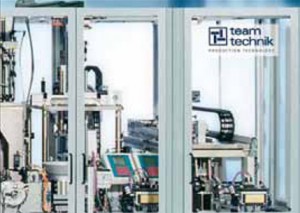 Team Technik is a 35-year-old German firm with three product divisions – automotive, medical and solar. Last year, its turnover grew from 85 million Euro to 145 million Euro. Its German facility, with two subsidiaries in China and one each in Poland, Atlanta and Arizona, is operating to full capacity.
Team Technik is a 35-year-old German firm with three product divisions – automotive, medical and solar. Last year, its turnover grew from 85 million Euro to 145 million Euro. Its German facility, with two subsidiaries in China and one each in Poland, Atlanta and Arizona, is operating to full capacity.
The company is planning to set up an office in India, most probably in Pune, the hot-spot for the automotive segment.
The company supplies products to Indian OEMs like Ford and Bosch from its German plant. Effica in Coimbatore is its partner for sales and service support in India.
VITRONIC
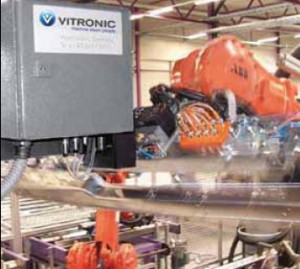 Vitronic is preparing to enter the Indian market. The company has its focus on three branches of robotics technology – industry, logistics and traffic. It also specialises in speed-tracking equipment, red-light checking and tolling applications.
Vitronic is preparing to enter the Indian market. The company has its focus on three branches of robotics technology – industry, logistics and traffic. It also specialises in speed-tracking equipment, red-light checking and tolling applications.
There is also a proposal to enter China, the main company focus being Europe, said Dr.-Ing. Norbert Stein, General Manager, Sole Shareholder, Vitronic.
SCHUNK
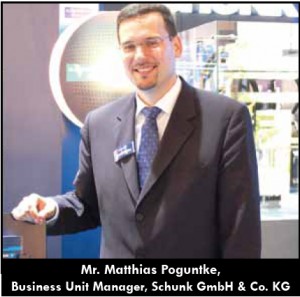 In India, Schunk’s share of automotive business is above 40 per cent. Schunk India in Pune, which started operations five years ago, is fast progressing and will open new branches soon.
In India, Schunk’s share of automotive business is above 40 per cent. Schunk India in Pune, which started operations five years ago, is fast progressing and will open new branches soon.
Supplying to a large number of customers in India, the product range covers automation systems for production lines. With the growing Indian demand, most of the products are imported from Germany for local supply. Around 3-5 per cent of its total sales are accounted for by the Indian market.
Employing a total 1,800 workers at the global level, the company has manufacturing facilities in the US, China and Germany. It also supplies components like grippers to OEMs, according to Mr. Matthias Poguntke, Product and Portfolio Management Gripping Systems, Business Unit Manager, SCHUNK GmbH & Co. KG.
Reis
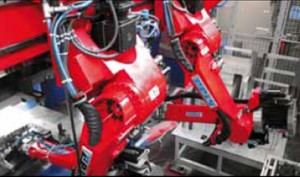 According to Dipl.-Ing. Paul Merz, General Manager, Reis GmbH & Co. KG Maschinenfabrik, since the automotive segment accounts for 60-70 per cent of Reis’ overall business, catering to demand from big customers around the world, his company, with manufacturing plants in Germany, the Czech Republic and China, is planning to set up its own subsidiary in India, initially with an office for sales and service.
According to Dipl.-Ing. Paul Merz, General Manager, Reis GmbH & Co. KG Maschinenfabrik, since the automotive segment accounts for 60-70 per cent of Reis’ overall business, catering to demand from big customers around the world, his company, with manufacturing plants in Germany, the Czech Republic and China, is planning to set up its own subsidiary in India, initially with an office for sales and service.
ABB
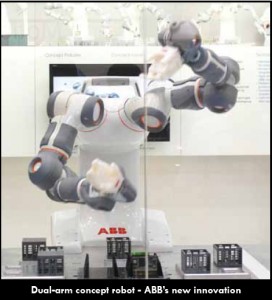 Mr. David Marshall, Marketing Communications Manager, Robotics Business Unit, Discrete Automation and Motion Division, ABB Ltd., observed: “Last year was the best ever for us with 40-50% of production going towards the automotive sector. Our main manufacturing plants are in China and Sweden. Our factory in Peenya is making automotive systems where 60 robot cells can be fitted. We have an automotive systems team in India, and we manufacture peripherals such as roller-hamming tools and welding fixtures specially for the local market. There are no plans at all to build robots in India where growth is not to the same extent as in other emerging markets”.
Mr. David Marshall, Marketing Communications Manager, Robotics Business Unit, Discrete Automation and Motion Division, ABB Ltd., observed: “Last year was the best ever for us with 40-50% of production going towards the automotive sector. Our main manufacturing plants are in China and Sweden. Our factory in Peenya is making automotive systems where 60 robot cells can be fitted. We have an automotive systems team in India, and we manufacture peripherals such as roller-hamming tools and welding fixtures specially for the local market. There are no plans at all to build robots in India where growth is not to the same extent as in other emerging markets”.
CLOOS
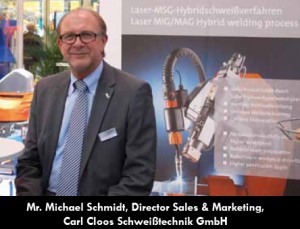 Cloos, established in 1919, is a specialist in arc welding and CO2 welding. It has already entered semi-automation and automation. With worldwide presence with sister companies in China, the Czezh Republic, Austria, Switzerland, England, Turkey, the US and Russia, the company has plans to enter Brazil soon.
Cloos, established in 1919, is a specialist in arc welding and CO2 welding. It has already entered semi-automation and automation. With worldwide presence with sister companies in China, the Czezh Republic, Austria, Switzerland, England, Turkey, the US and Russia, the company has plans to enter Brazil soon.
Mr. Michael Schmidt, Director – Sales & Marketing, Carl Cloos Schweißtechnik GmbH, said: “In India we have a subsidiary at Pune and have sold several systems in the market. Normally we have sales and service organisation, but our target, as in the case of China, is to build a company to install the robots systems. Sales in India started quite well and are picking up. We see a prosperous future in the Indian market, and have chosen Pune as the location for our facility. Our R&D expenditure is 6% of our total turnover. We are working on eco-friendly welding machines for better energy saving”.